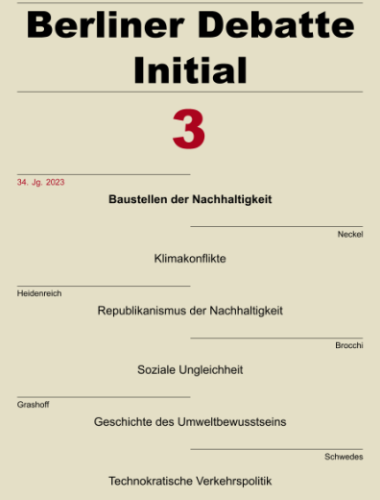The year 2023 ends as it has started: with the announcement of a new publication. And this time it’s a special one!
A colleague and I teamed up to write what might be considered an opinion piece. I never thought I’d write something like that. Yet, the journal Berliner Debatte Initial is the place for just that: to strike up a lively debate.
As I have recently been digging into the topic of science communication and had already published a few findings and what might be considered desiderata, I realised that I developed a strong opinion on the following conundrum: science (“Wissenschaft”) in Germany usually means research and higher education being thought together (I know, just as Humboldt is said to have said), but science communication mostly focussed on research results. As a scientist, you start communicating when you’ve got a result, a prototype or a product (like a text or a new process) ready. And as someone looking to start communicating with a scientist, you usually search for research results: The reporter comes when there’s a new theory, the politician wants to have more or less definitive answers based on outcomes for a clearly defined problem.
There are some attempts now to widen science communication to include the process of getting to those research results. All the stuff going on about citizen science goes into that direction. That is a good step, yet, it comes with its own set of problems, amongst them the reluctance of scientist in a competetive pseudo-market to divulge something that is still not ready, their adherence to good scientific practices (which means to double-check and peer-review) as well as non-scientists’ aim to get definitive answers and not titbits of work-in-progress.
Anyway, even if citizen science takes off, there is one element of –at least my understanding of– science missing. And that is the part where higher education is involved. Isn’t that science communication as well? If not, why not? If so, which part(s) of it: all of tertiary education from the moment one begins it? Or just some not always included self-reflexive parts about sciences as such? If science communication means communication with non-scientists, does that limit higher education as science communication to the BA-level? Or is that an individual process?
Not all of these questions are answered, but a strong emphasis is being made to at least included higher education into notions of science communication in the (German-langauge) article my colleague and I have written. It can be downloaded here under the programmatic title “Wissenschaftskommunikation und Hochschullehre zusammendenken.” That it was published in the journal’s thematic issue on “construction sites for sustainability” is a coincidence, yet quite fitting.
I also consider uploading it here on the blog when the journal’s copyright expires in a few months. Keep an eye out!

